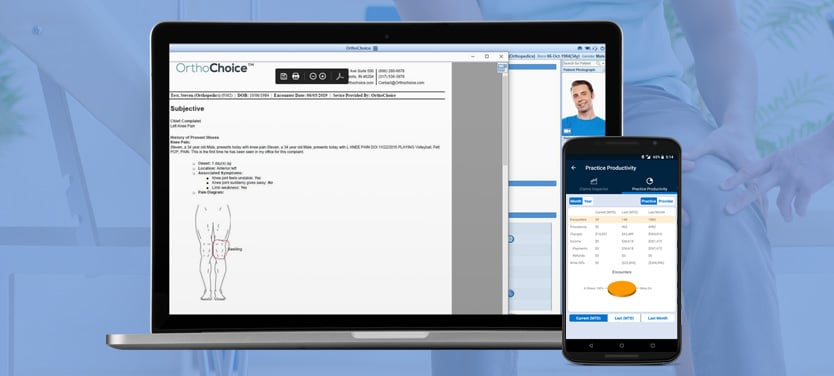
7 Features Your Orthopaedic EHR Should Have
Not every Orthopaedic EHR is the same. Ortho providers need a specialty-specific Electr...
March 24, 2020
Your Orthopaedic practice has enough on their plate. A one-size-fits-all generic Electronic Health Record will maybe help you and your team deliver the bare minimum in practice efficiencies, but it will hold you back from optimizing the care you deliver and your ability to grow. The good news is that a specialty-specific Orthopaedic EHR can align your practice to work more efficiently and effectively, promoting growth in your team, your practice, and your patients.
Features of a Quality Orthopaedic EHR:
1) Custom Templates
Customization is non-negotiable for any specialist, especially an Orthopaedic doctor. The ability to tailor your forms and templates to fit the needs of every encounter enables physicians to record information as accurately as possible. This makes the data a physician references in later visits more well-rounded and accurate. Your Orthopaedic EHR should also be equipped with custom order sets that fit the needs of each provider in your office. Without customization in your Orthopaedic EHR, the integrity of your data is compromised, and your physicians sacrifice their clinical decision making.
2) Real-time Eligibility
It is important that every provider be able to verify the patient’s eligibility for services prior to rendering them in a visit. If your Ortho practice is not set up to do this, then denied claims will continue to bombard your practice, keeping it from on-time and in-full payments from insurance companies. Real-time eligibility verification in your Orthopaedic EHR enables your team to verify coverage before services are rendered to the patient. This helps the provider ensure that their payment is on the way or work with the patient to find the best options available to them under their insurance.
3) ePrescription
Many Electronic Health Records offer the ability to write prescriptions electronically. There is more that can be done to make sure your team is prescribing the best medication and offering their patients the best solution for picking up their prescriptions. Your Orthopaedic EHR should equip your team with a current list of the most used prescriptions in the field of Orthopaedics, curated by the top specialists in the country. This will make the process of prescribing much easier, regardless of the diagnoses. Geo-based pharmacy recommendations should also be available in your Orthopaedic EHR to help your patients access their prescriptions no matter where they are.
4) Mobile Portal
Most every practice has a portal for their patients to access. It helps them stay informed, up to date, and engaged regarding their own care and health history while also giving them a simple way to pay their bill and communicate with their provider. Your Orthopaedic EHR should take it one step farther by giving patients the ability to access their patient portal on the go. Now, they can view test results as they come in, make a payment the moment it crosses their mind, and message their doctor from their mobile device. Mobile Orthopaedic EHR options should also be available for the provider to use to more effectively communicate with patients and staff while they are on-the-go.
5) Digital Intake
Digital intake has revolutionized how providers are collecting patient data and accessing the most accurate patient health information possible. With digital intake in your Orthopaedic EHR, your staff will no longer have to manually transcribe patient health information. Digital intake enables the patient to input and update their information so that it shows up directly in their chart. This improves the accuracy and integrity of the information your team has access to during patient encounters, improving clinical decision making and the quality of care the patient receives.
To learn more about an Orthopaedic EHR that could help your practice, click here.